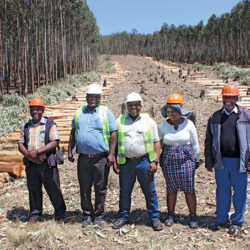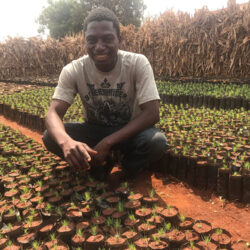There is a spark of belief among forestry stakeholders that solutions to the deepening logistics challenges faced by the sector are beginning to click into place …
Never mind the energy crisis – South Africa is facing a ‘logistics crisis’ as poor levels of service and maintenance in key freight rail corridors and at ports that provide gateways to international markets are putting the brakes on an already struggling economy. The forestry sector is directly impacted as it depends heavily on rail and the ports of Richards Bay and Durban to move timber from the hinterland to the mills where it is processed before being exported as chips or pulp.
Deteriorating service on the coal line from the Mpumalanga highveld to Richards Bay has seen the volume of timber moved on this line halve since 2005 from 3.5 million tons a year to a little over one million tons. The rest of that timber has gradually been shifted from rail onto long haul trucks, much to the delight of private sector transport contractors, but the consequences are being felt across the board: increased transport costs, damage to road networks, traffic congestion, increased CO2 emissions etc.
However there is a glimmer of good news amid the gloom: the Forestry South Africa (FSA) team that attended a recent high level meeting between President Ramaphosa, senior ministers, captains of industry and the members of Operation Vulindlela, report that there are strong signals from government that they are gearing up to address the logistics bottlenecks at last. This follows a frank admission by the President himself that the transport challenges are as damaging to our prospects of economic growth as are the electricity challenges.
The forestry sector was well represented at the meeting by FSA’s Michael Peter and Francois Oberholzer, along with the CEOs of Sappi, Mondi, NCT, TWK and PG Bison.
Furthermore, the President has agreed that private sector participation in ports and rail must be fast-tracked as Transnet cannot address the challenges on its own. This aligns with the recommendations of the private sector forestry stakeholders who have indicated a willingness to get involved in facilitating the operation of a freight service utilising Transnet infrastructure that is dedicated to timber.
The President also indicated that regulatory and structural reforms recommended by the Operation Vulindlela team are already being implemented; and that a national logistics crisis committee – similar to the one that is addressing electricity outages – is being established in the presidency.
This is a significant step forward according to FSA, as without such a committee there is no hope of achieving alignment between Transnet and the relevant government departments that impact on freight rail infrastructure and services.
Apparently the President has already met with the Transnet board and other ministries to set the ball rolling.
One of the key challenges is that the forestry sector is a minor player in freight rail, contributing only a fraction of the total tonnage of goods like coal, chrome and manganese moved on the country’s rail networks. This has resulted in available locomotives and wagons being deployed to haul coal and other BIG commodities while the service to timber customers has become less and less reliable.
The imminent visit by Public Enterprises Minister Pravin Gordhan to China to resolve the stand-off over the delivery of locomotives and spares by Chinese state rail equipment manufacturers to Transnet is another sign that something positive and constructive is on the go. The impasse between Chinese state rail equipment suppliers and Transnet occurred because of alegations of improper awarding of tenders worth some R54 billion.
Another bone of contention between government authorities and the forestry sector are the regulations that are limiting the use of PBS vehicles to haul timber by road. These trucks are capable of carrying bigger payloads (up to 70 tons vs 38 tons for a standard long haul truck) and bring many benefits for the timber growers, but can only be utilised under special permits issued by transport authorities. Use of PBS vehicles is still strictly a ‘pilot project’, but it has long since demonstrated improvements in safety, efficiency and cost.
In this regard the President has agreed that the Minister of DFFE should be drawn in to help solve these challenges. Meanwhile minister Chikunga of DoT, in responding to points made by the FSA team, said that she has approved the exceptions for ISO and High Cube containers which indicates that the PBS exemptions will follow shortly. This has been a decade-long challenge with the DoT and will provide major relief for the forestry sector and others using PBS vehicles.
FSA Operations Director Francois Oberholzer said that forestry stakeholders are preparing to submit an unsolicited bid to Transnet in an effort to get involved in the operation of a freight service on the Greytown branch line which services many commercial timber growers. The service levels on this important line have been falling for years.
At the end of the day tree farmers need to get their timber to market as cheaply and efficiently as possible, and everyday road users will be happy to see timber going back onto rail where it belongs.




